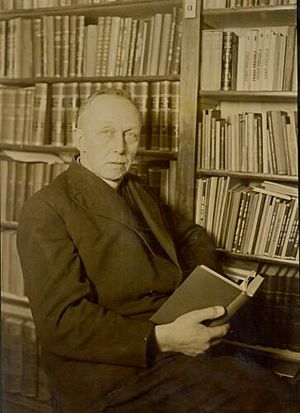Fran Saleški Finžgar facts for kids
Quick facts for kids
Fran Saleški Finžgar
|
|
|---|---|

Fran Saleški Finžgar (1931)
|
|
| Born | February 9, 1871 Doslovče |
| Died | June 2, 1962 (aged 91) Ljubljana |
| Occupation | Roman Catholic priest, novelist, short story writer, playwright, poet, translator |
| Language | Slovene |
| Notable works | Pod svobodnim soncem (1906–1907) Mister Torrent (1941) |
| Notable awards | Prešeren Award (1951) Levstik Award (1953) |
Fran Saleški Finžgar (born February 9, 1871 – died June 2, 1962) was a very popular Slovene writer. He was known for his novels and short stories. He also wrote poems and plays.
Contents
Early Life and Education
Fran Saleški Finžgar was born in a small village called Doslovče. His family was poor. This village was in a region called Upper Carniola. At that time, it was part of the Austro-Hungarian Empire.
He went to primary school in Radovljica. Then he attended secondary school in Ljubljana from 1882 to 1891. After that, he studied at a college for priests.
Career as a Priest and Writer
Finžgar became a priest in 1894. He worked in different churches in Upper Carniola and Ljubljana. He retired from being a priest in 1936. He passed away in Ljubljana when he was 91 years old. He was buried in the Žale cemetery.
Finžgar believed in ideas similar to Christian Socialists. These ideas focused on helping people and society. He was also friends with Ivan Cankar, another famous Slovene writer. Cankar was a Social Democrat. Finžgar even helped him when he was dying in 1918.
During World War II, Finžgar worked with the Liberation Front of the Slovenian People. This group was led by Communists. This caused some disagreements with the bishop of Ljubljana, Gregorij Rožman.
Friends and Connections
Many smart people visited Finžgar's home in Doslovče. His best friend was Izidor Cankar. Izidor was an important art historian. Janez Bogataj, an expert on culture, spent his childhood with Finžgar. Bogataj later helped turn Finžgar's birth house into a museum in 1971.
The famous architect Jože Plečnik was also a close friend. When Finžgar was a priest in Trnovo, Ljubljana, Plečnik was his neighbor. In the late 1920s, Finžgar asked Plečnik to renovate the Trnovo parish church.
Finžgar's Literary Works
Finžgar started writing as a poet. But he later became known for his stories. He wrote novels that showed life in villages and small towns. His most famous book is a historical novel called Pod svobodnim soncem. This means Under the Free Sun. He wrote it between 1906 and 1907.
This novel was inspired by Polish writer Henryk Sienkiewicz. It also used ideas from Slovene myths. The story takes place in the 6th century AD. It is about the conflict between South Slavic tribes and the Byzantine Empire.
Finžgar also wrote short stories and tales for children. His best-known children's story is Mister Torrent (Gospod Hudournik). This story praises nature. It tells about the adventures of a clerk from Ljubljana in the Karawanks mountains. He also translated works by the Austrian poet Peter Rosegger. Finžgar admired Rosegger's writing.
He was the editor of a family magazine called Mladika, which means The Shoot. He was also a member of the Slovene Academy of Sciences and Arts.
Preserving Slovene Heritage
In 1939, Finžgar helped arrange the Prešeren House. This was the birth home of France Prešeren, a famous Slovene poet. The house is in Vrba, a village near Doslovče. It opened as a museum on May 21, 1939.
In 1940, the Prešeren House and the village were filmed. This was for a black and white sound documentary called O, Vrba. It was directed by Mario Förster. The film was made in 1941. Finžgar presented the house in the film. Another poet, Oton Župančič, read the poem "O Vrba".
See also
 In Spanish: Fran Saleški Finžgar para niños
In Spanish: Fran Saleški Finžgar para niños

